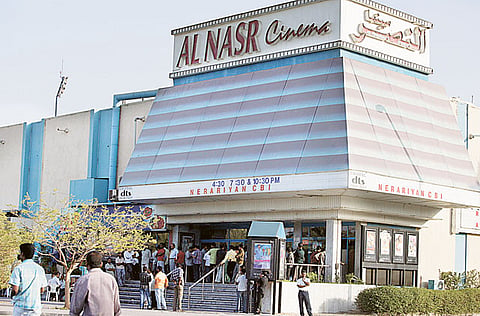A walk down cinema lane in the UAE
On the eve of UAE's 40th National Day, we revisit a lost era of film viewing in the UAE

Being in Dubai at a time when street names were non-existent, landmarks were used to guide visitors and cinemas seemed almost strategically placed on the city plan. I have found one in almost all directions forwarded by friends. "Take right from Strand", "Besides Deira cinema", "opposite Al Nasr" were common phrases not just in the 1970s and '80s but in the '90s too. On the eve of UAE's 40th National Day we revisit a lost era of film viewing in the UAE with Ahmad Golchin of Gulf Film, the first distributor of films in the UAE.
"When I came here in 1963, there was only the National cinema in Nasr Square. Unlike today, Nasr Square was the end of the city then. The open air cinema was next to a cemetery and there were no bridges or tunnels that connected Deira and Dubai," Golchin says. The only transportation was the abra, but this did not stop people from attending the movies for it was the sole entertainment for people. Apart from this, there was a cinema at a military camp in Sharjah, which they kindly opened to the public, and a gold merchant opened a cinema on the Dubai side in Jumeirah, where now stands a petrol pump and shopping centre."
The public's expectations from a cinema were few. All that was needed was a large wall painted white and a projector and it would run full house. "Where now we have proper parking spaces filled with the latest car models, there were donkeys and camels patiently waiting for their owners to return," says Golchin, laughing. "A bell announced the start of the show, and five minutes before the film ended, the bell was rung again so that taxis could arrive to take home those living far away".
One of my earliest movie experiences in Dubai was at the Rex cinema on Al Khawaneej Road which was popular with families who would arrive with picnic baskets and let the little ones run around while enjoying the film on mats or in cars with piped-in air conditioning.
Demolished
In the 1970s things started changing. While the National and Jumeirah cinemas were demolished in the wake of development, names such as Deira, Strand, Plaza, Al Nasr and Dubai cinemas became popular. Deira cinema was the first air-conditioned cinema, opened in the late 1960s. "Those days [in the '70s and '80s] we didn't watch so many movies but visiting the cinemas was a low-budget fun family outing. I remember going to the Strand, Plaza and Al Nasr, the latter for English movies," says Gauri Suri, an Indian who has grown up in the UAE. "Also, we did not have so many movies showing at the same time. Show times were fixed and everything was planned around it."
In the 1960s, to accommodate families, "boxes" were created. "At the end of the saloon, enclosed areas were created out of cardboard cartons to provide privacy to families," says Golchin.
Due to the lack of television and with rare transistors, newspapers and telephones, movies were the only entertainment. Films were shown through the week, often alternating. "There was one set shown on the weekends, while the others ran through the week. Some repeated several times. There was no way of advertising them. We would either put up a placard on the abras announcing them or hire a town crier to wear written posters if the film was important".
Most popular
Arabic and Hollywood films were rare, with Bollywood most popular. "Getting Hollywood films was very difficult in the 1960s and '70s. Indian films were brought by gold merchants who traded with the country. And even when the prints were really bad, nobody minded it," said Golchin.
In 1998, Golchin took over Al Nasr cinema and converted it into the first cinema in the UAE offering Dolby sound. But the building itself was faulty and Golchin recalled an incident that took place at the time Titanic was released. "Titanic was released in the UAE at select cinemas in the UAE. Unfortunately, it rained very heavily in Dubai that year and the building's roof, which was not built to withstand such weather, started leaking. Water was filling in the hall and viewers were getting angry. Just as the Titanic, it seemed we were sinking too."
Though the Galleria at the Hyatt Regency was the first "twin" screen cinema in Dubai, the multiplex culture became strong only in the '90s with the opening of Grand Cineplex and Cinestar (Deira City Centre) cinemas. "Though Firdous and Al Maria were the first cinemas in Abu Dhabi, El Dorado was the first ‘twin cinema' to be built there. The first cinema in Al Ain was built by a Pakistani who fell on hard times. But I remember there was no electricity there then and the projector ran on a generator," adds Golchin.
"We were not allowed to go to the cinemas alone when younger," recalled Suri. "Mainly for security reasons but today I feel it's safer with the multiplexes and I see a lot of younger viewers going to the movies without adult supervision".
"A multiplex is like buffet offering a variety of cinema to the viewer — action, comedy, classic, drama — while earlier people had no option but to watch what was running," said Golchin. "Countering piracy is another reason why multiplexes happened. But the younger generation cannot imagine what we've seen, except in photos and what we tell them."


